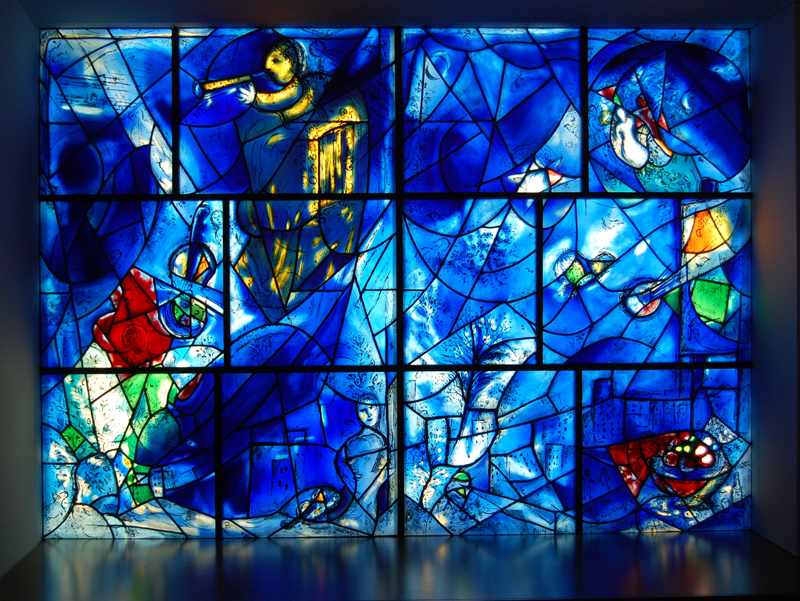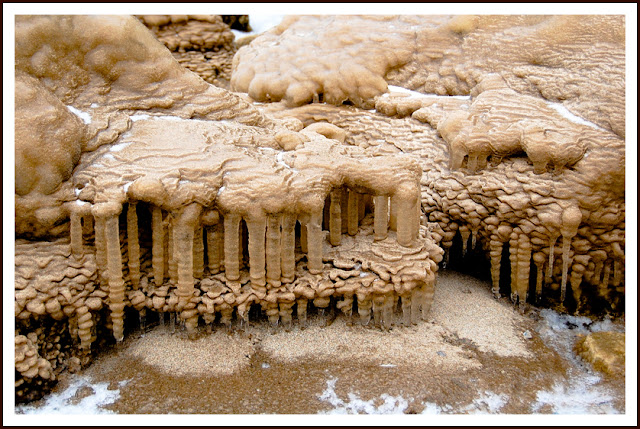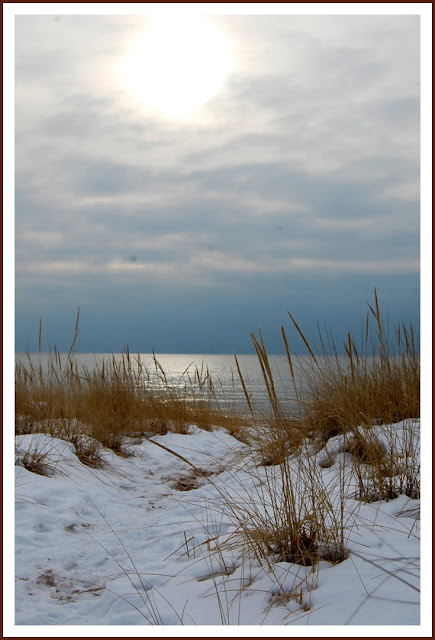-
Segment 1 of "America Windows" by Marc Chagall, Art Institute of Chicago
In this late afternoon blue winter light, as the window of one year is being shuttered and a new one about to be opened with the flare of a candle, thoughts about an artist and a poet are synchronizing in me.
Segment 2 of "America Windows" by Marc Chagall, Art Institute of Chicago
Segment 3 of "America Windows" by Marc Chagall, Art Institute of Chicago
(this photo from The History Blog)
As you may have noticed I have been posting a lot of poems by German poet Rainer Maria Rilke these last few months. His focus on the inner landscape is right up my alley, and with every new poem I read, my heart expands a bit more.
What came together for me as Don and I walked the streets of Chicago were the parallels between Marc Chagall and Rainer Maria Rilke. For both men, Russia is incredibly important. Chagall was born there (in Vitebsk, Belarus, in 1887 – he died in 1985), and Rilke (born in Prague in 1875, and died December 29 in 1926 in Switzerland) spent many months there with his dear friend Lou Andreas-Salomé. For Chagall, though he left Vitebsk for Paris and other parts of the world for good when he was 36, Russia remained his soul’s home throughout his 97 years of life. For Rilke, after just a few months in Russia, he claimed it as his heartland and felt that no people understood spirituality more than the Russians. Both men lived through World War I and struggled to make sense of a world in which such a war could happen. Both men migrated to Paris and found intense inspiration from artists there. For both of them, angels populate their work. Chagall’s windows and paintings are sprinkled with angels flying in the skies. For ten years Rilke wrote the Duino Elegies, of which angels are a central theme.
What most impresses me in connecting Chagall and Rilke is how they carried the world consciously in their souls. Chagall left his hometown of Vitebsk, but it was so dear to him that he kept painting it in signs and symbols in many of his paintings, often with his beloved wife Bella as a personal representation of Russia, his soul’s home. Rilke too transformed the stuff of life – things -- into inner material that could remain with him always. And always he was trying to reconcile the true and even dark facts of the world into a harmony of the soul. You can see what I mean in the poem of his I’m posting, below.
In the mind-boggling and cumbersome intensity of the world’s problems bending the corner with us into the new year, I am inspired by these two who continually processed and transformed the facts of the world into the truth of the soul, where our response to the world is what matters. Through creative expressions, we can love this place of ours.
Out of the deep admiration that my friend Lorenzo of The Alchemist’s Pillow and I feel for Rilke’s poetry, and because there is a new volume of daily readings titled A Year with Rilke (translated and edited by Joanna Macy and Anita Barrows), we are launching a new blog containing these daily passages, much like my blog RUMI DAYS, which shares readings from another HarperOne publication, A Year With Rumi. Our blog A Year With Rilke will offer passages of letters, prose and poems of Rainer Maria Rilke exactly as published in that book, except that we will add images to the readings. The blog is live, and daily postings will begin January 1. The following poem will be featured at the blog March 18 and expresses what I have shared today.
The Interior Castle
by Rainer Maria Rilke
Nowhere, Beloved, will the world exist, but within us.
Our lives are constant transformations. The external
grows ever smaller. Where a solid house once stood,
now a mental image takes its place,
almost as if it were all in the imagination.
Our era has created vast reservoirs of power,
as formless as the currents of energy they transmit.
Temples are no longer known. In our hearts
these can be secretly saved. Where one survives—
a Thing once prayed to, worshipped, knelt before—
its true nature seems already to have passed
into the Invisible. Many no longer take it for real,
and do not seize the chance to build it
inwardly, and yet more vividly, with all its pillars and statues.



















































